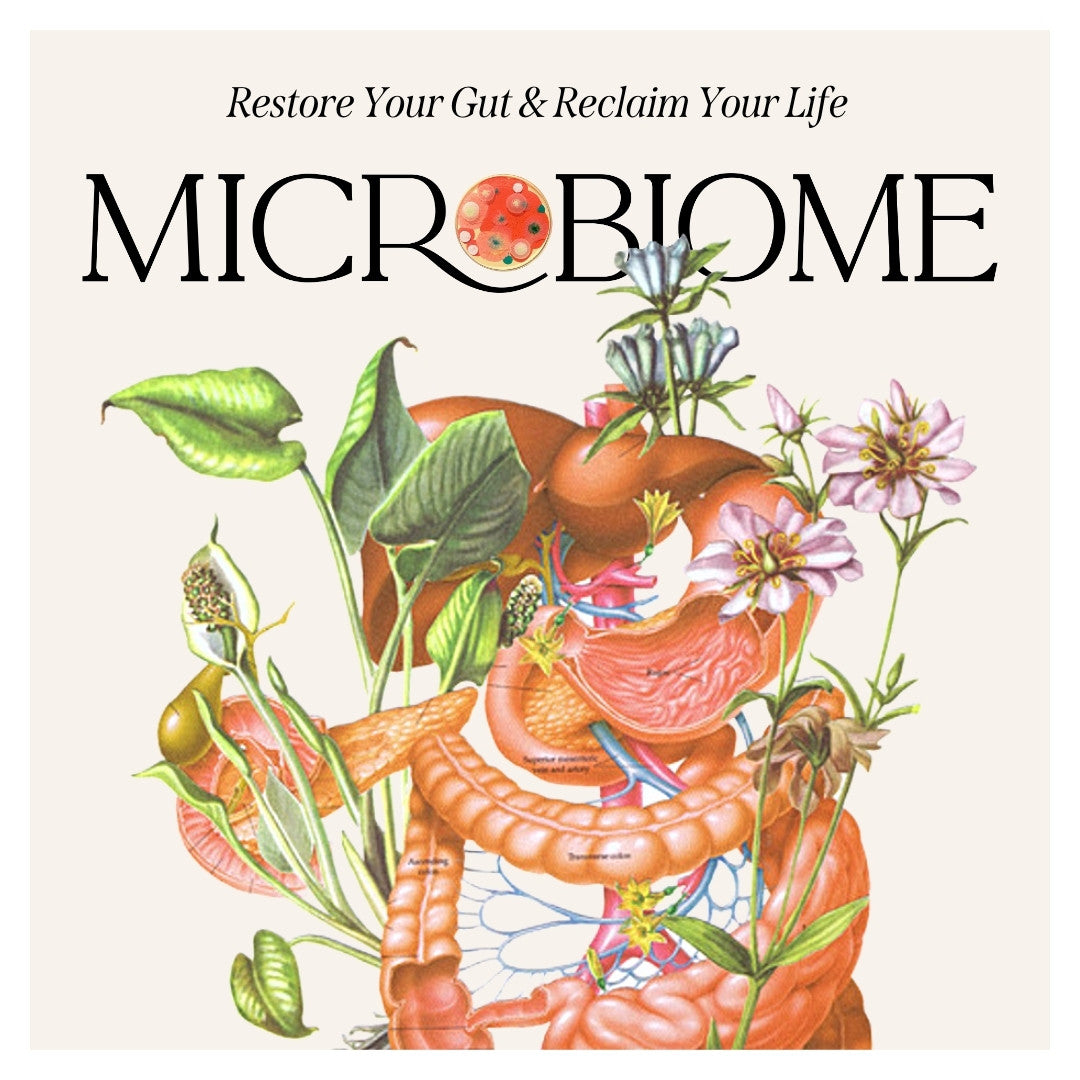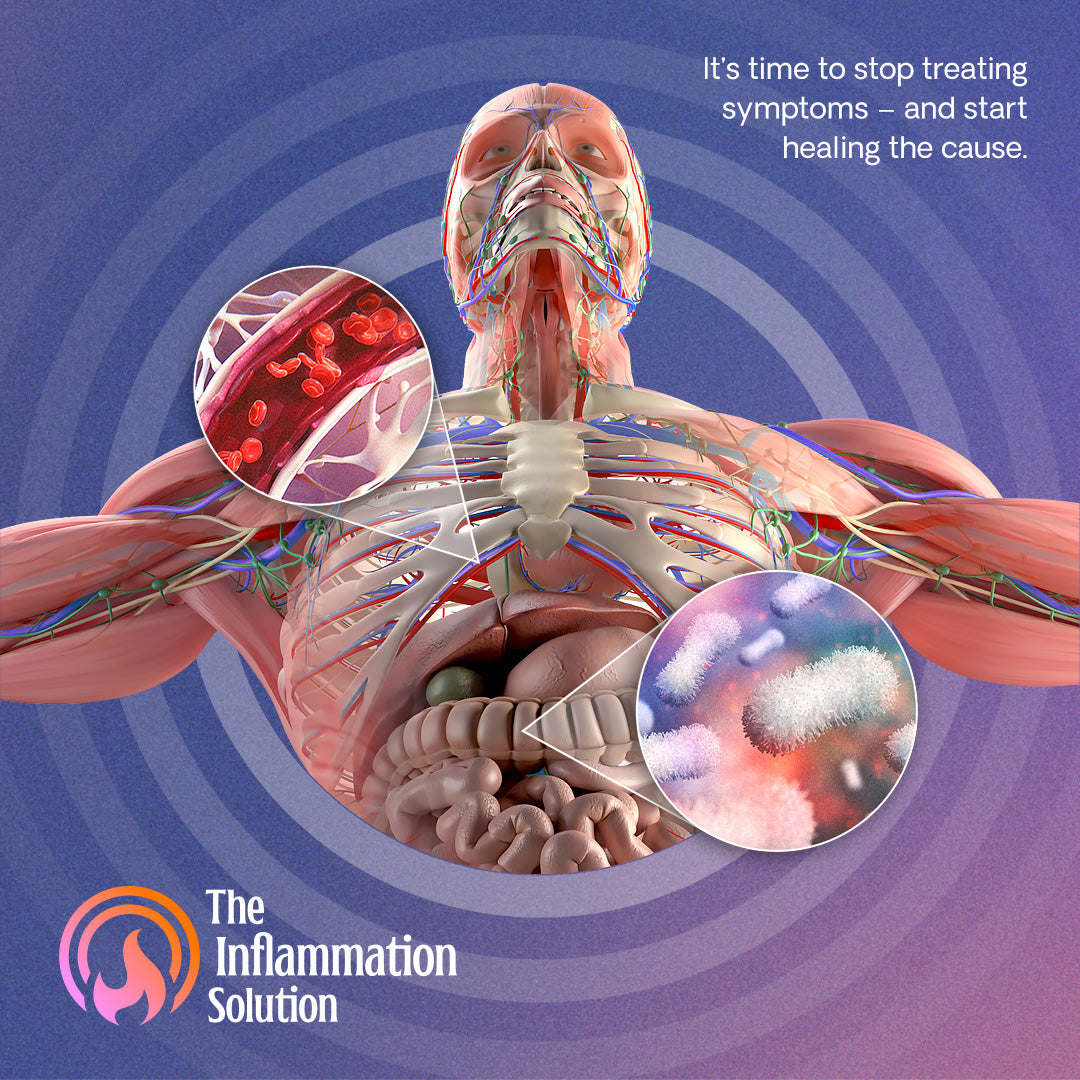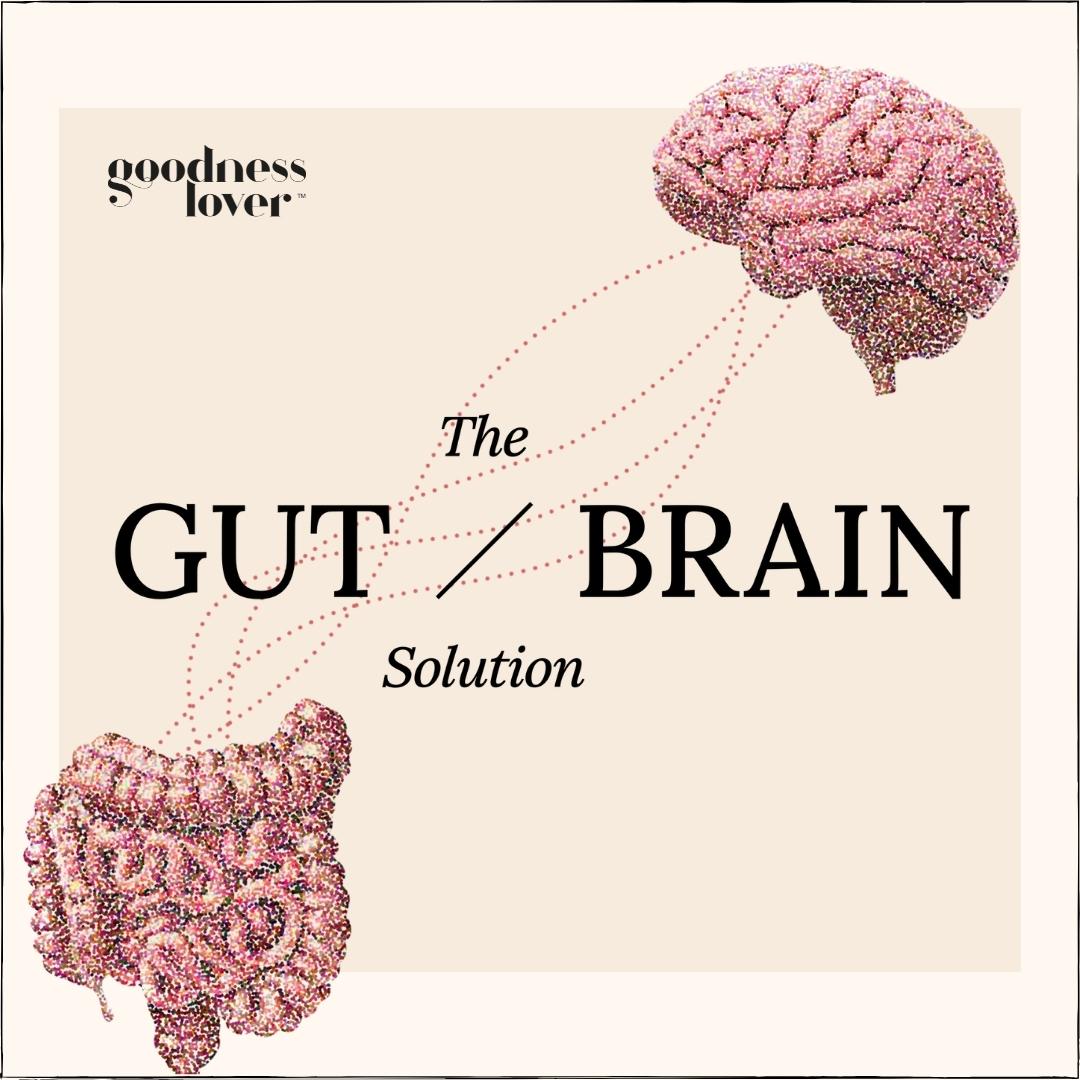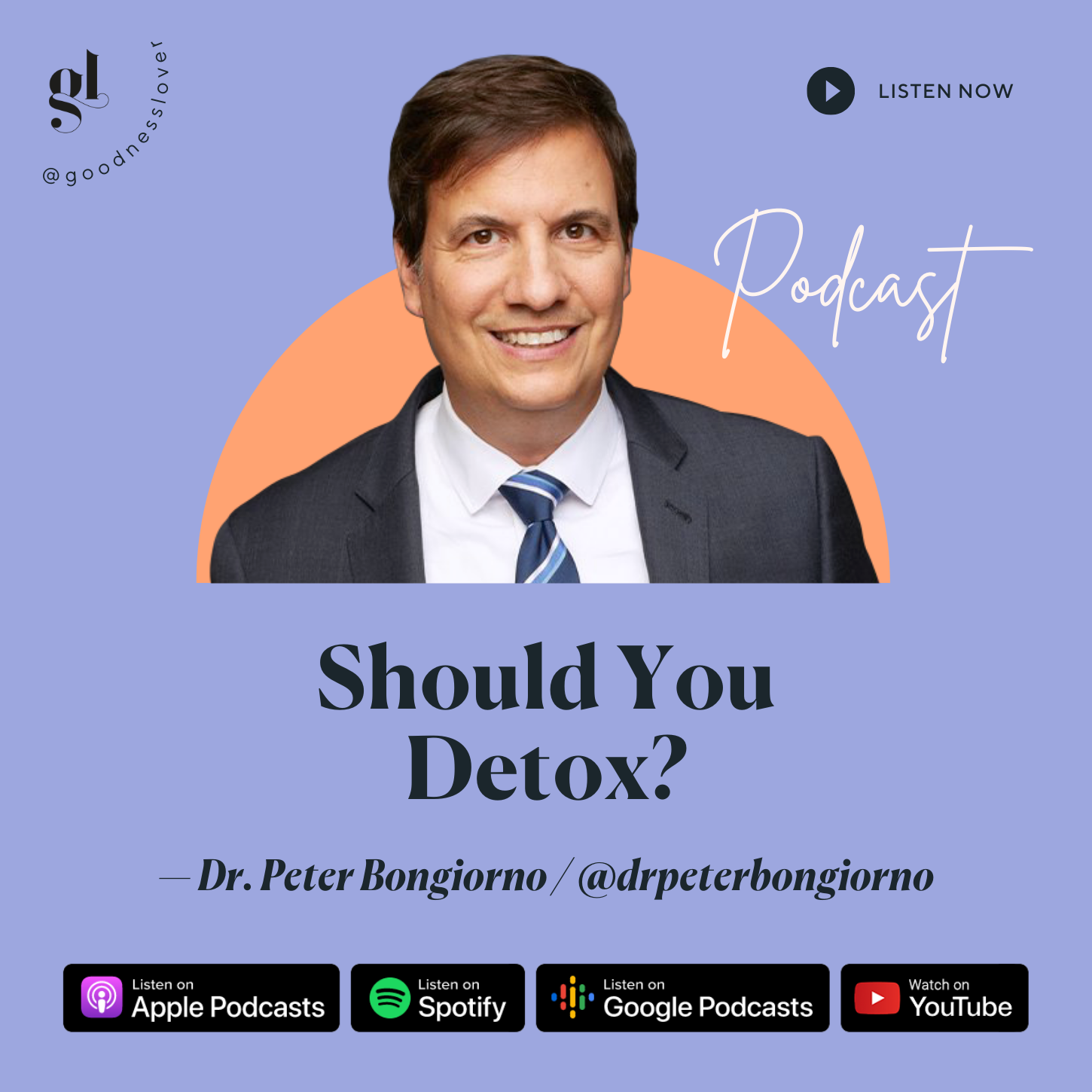Introduction
Many people know that bitters are a key ingredient of cocktails…
But very few people are aware of just how beneficial they are to digestion, healthy aging, weight loss, and soooo much more!
This week on The Goodness Lover show, we spoke with Dr. Jennifer Stagg, all about the health-promoting power of bitter foods!
PS. Coffee lovers will love this episode 😆 So if you want more excuses to keep drinking your favourite beverage, check it out 😉
Watch the Interview:
Dr. Stagg discusses:
🦠 How to utilise the bitter receptors in your GI tract to promote digestion
🥗 How bitters help the body properly absorb food
🧠 How these foods fight off chronic diseases such as diabetes and Alzheimer's
🤔 Where to find these phytochemical-rich superfoods in the supermarket
And much more!
Additional Resources
To connect with Dr. Jennifer Stagg and discover more of her work, you can find her on Facebook. You can also visit her website here.Transcript
Sarah: Hello. And welcome back to the Goodness Lover Show. Today, we're joined by a naturopathic doctor, Jen Stagg, who's here to talk to us all about bitters, which are nature's underrated powerhouses. You're going to find out about how these little compounds are actually so important and powerful for our digestion, weight metabolism, blood sugar regulation, and so much more. Let's get into it. Okay. We are very excited to have naturopathic doctor, Dr. Jennifer Stagg, or Jen Stagg here with us today to talk all about bitters. Thank you for joining us.
Dr. Jennifer Stagg: Thanks so much for having me. I'm excited to talk about bitters.
Sarah: So when it comes to bitters, I suppose maybe most of us are aware of their use in cocktails maybe, or just that it's a slightly unpleasant taste. But as a teaser, I guess before we dive into it, everyone knows bitters are amazing and we're about to actually understand why. So thanks for unpacking it all for us today, Dr. Jen. And so before we get into that, though, I'd love to hear a bit about you. How did you get into natural health and what really got you excited about bitters to begin with?
Dr. Jennifer Stagg: Yeah. I mean, I've been practicing as a naturopathic physician since 2003, so quite some time now. My education leading up to that point was all in biochemistry, and I actually was in a PhD program in biochemistry. At that time, I decided to switch gears and go into clinical medicine because I just didn't see myself working in a lab for the rest of my life.
But with that background, I did a lot of research on phytochemicals, small components in food. My focus was nutritional biochemistry. So that always kind of like... There was that deeper understanding of the biochemistry of food. So then as a naturopathic physician, of course, foundation of naturopathic medicine is food and nutrition. And we get a very deep knowledge and understanding of working with patients with nutrition.
As I got into clinical practice, then I started doing a lot of work with genetics and epigenetics, doing a lot of genomic testing. And I wrote my first book about genomic testing and epigenetics. And that kind of led me further into, like, I touched on phytochemicals there, but I didn't really talk about bitters per se. But within that kind of whole area, essentially, I was finding that there was a way to better understand the really powerful chemicals in food and how they interact with our body.
These powerhouses fall into this category of nutritional bitters. Bitters are phytochemicals. Certain phytochemicals obviously aren't bitter. But if something tastes bitter, it obviously is packed with phytochemicals. But certainly a lot of bitter components in food don't actually taste bitter, but they can bind the bitter taste receptors. So really it was kind of like out of epigenetics, then I kind of like went further into food because people were then asking me, "Well, what exactly should I eat?"
And people were having a lot of digestive problems and I treated a lot of that and seeing a lot of digestive abnormalities and just poor digestion, responding well to a lot of herbs that we use, our bitter components. So all kind of flowed from there and I was able to come up with a more, I don't know, specific system to help people get improved health through nutrition, focusing on bitters.
That's a really long answer, but that's how I came to write this book and help people better understand it. I don't think I came across a book that's written for the lay public on bitters per se. There's a couple of cookbooks that are about bitters and cooking, which are fantastic. But not a lot of health and wellness books focusing on bitters.
Sarah: That's right. I have a copy of the bitter prescription here in my hand, a digital version. So I was saying before the call to Dr. Jen that I was reading all the subheadings going, "Ooh, that sounds interesting. Ooh, that sounds interesting. Bitters connects to this, bitters connects to this. This is how it works." And so we'll get through as much of it that we can today. But for those that are wondering, the book is called The Bitter Prescription, and you can get it online?
Dr. Jennifer Stagg: Yeah, absolutely. So you can get it on Amazon, Barnes & Noble, anywhere books are sold basically. And so yes, there's paper copies available and then obviously digital are of course available.
Sarah: Okay. Awesome. So bitters, they are phytochemicals. Tell us a little bit more about them. Where can we find them and what is our historical relationship with bitters as humanity?
Dr. Jennifer Stagg: Yeah. So when we think about bitters, as you mentioned, a lot of people really only have maybe, if they have heard about them, they're often like a cocktail ingredient. And those compounds, it's kind of interesting, the like bitter tonics, we're used historically as kind of like an herbal tea or a digestive to enhance the digestion of like a heavier meal.
And it was kind of like the upper class would use these as part of their series of events preceding or a post-meal to improve the digestive process. And it does taste bitter. Those bitters have that bitter component. So it is bonding these bitter receptors. So we have those on our tongue. And so obviously everyone's heard of like bitter taste, anything. Certain foods taste more bitter than others and they're binding a bitter taste receptor on your tongue.
Interestingly, now we know that there are bitter receptors all throughout our digestive tract, so that this also binding further down in the intestines. But now we know that there are bitter receptors even in our brains, in heart tissue. They're really all over the body. And this is why there's a lot of research now looking at bitters in relation to other aspects of health, like brain health and cardiovascular health, and a lot of data on what bitter compounds can do to improve other health aspects.
But if we go further back, like bitter was associated as a taste evolutionarily as like, if something was very bitter, this might be a food that also has poisonous compounds in it that we should maybe avoid eating too much of that food that was really concentrated. So that's kind of like that evolutionary perspective to kind of like limit your bitters, because it would have other compounds in there. So there was a protective component to it as well.
Matt: Interesting. I love this biochemistry background with going to this bitters angle. I think that's really interesting. So I'm curious as to when you started this journey, was it a particular study or is it really using any clinical practice that was starting to see that bitters are actually really powerful phytochemicals?
Dr. Jennifer Stagg: Yeah. I mean, historically, naturopathic doctors, using the tradition of herbalists, using bitters in practice, so bitter tinctures to improve digestion. Those have been around for hundreds of years. So there was always that clinical aspect that I knew how to use bitters in that way. And learning about these plants when I was back in naturopathic medical school. Use of bitter melon, for example, to improve glucose regulation.
So then there were also these known other aspects about bitters, but not a ton of information. We mostly thought about it as like for someone who kind of had like troubled digesting, that you would give them bitters before a meal, or we would use like bitter melon to help a diabetic or pre-diabetic. But as I started doing a lot of the genomics work, our genetic variance with our taste receptors for people who have like more of a taste for bitter and more sensitive to bitter.
And that kind of then led me into like, oh, well, I kind of came full circle thinking about, well, I should look at these bitters a lot more because now we have genetics popping up and it's being [inaudible] taste receptors and the differences between people who are more prone to obesity and their taste for bitter. So that's kind of where I really started doing a deeper dive and looking at the new research on bitters, and that led to kind of where I went clinically with the use of bitters.
Matt: Interesting. And I think you mentioned something on the... We were talking before the call and you said that, unfortunately, bitters are actually sort of getting bread out of our food systems. Could you explain that a bit more?
Dr. Jennifer Stagg: Yeah. So over the last hundred years, our food supply, as most of us know, has changed so much. And with this commercial production of food, it is geared towards having people having this preference for sweet, essentially. And so the sweeter components of food have been selected for and the bitter components are being deselected basically. So now, for example, a tomato that you would buy, a conventional tomato at the grocery store tastes sweeter than it ever has.
And if you were to eat like an heirloom variety tomato, it would taste bitter, but more complex. And so that can be off-putting to people. So because our society is being exposed to so much produce that has more of a sweet taste to it, we're getting less of these bitter compounds, of course, because there's less of those in the food, but also our preferences have changed.
So this is why kids can have problems with eating enough vegetables because they're not exposed to those compounds. Now, if you eat organic foods and you eat non-genetically modified foods, then obviously you're not going to see the same changes. But conventional produce definitely has less of those bitters in food. And there's some evidence leading us to think, well, maybe this is part of the reason why there are increased rates of obesity and diabetes even, because of the quality of our food supply.
So you could be eating what we would qualify as a healthy diet with plenty of vegetables. But if they're all conventionally grown, like, there's differences between exact types of produce. But if you're eating all conventional food, it does affect the quality of the foods. You're getting less of those bitters in your food.
Sarah: Yeah. I was reading a study this week on soybeans and comparing GMO, to conventional, to organic. And it was basically that in a hierarchy as far as their nutritional composition went. So the more organic, the more vitamins and minerals. But actually, the GMO had more fiber, which is interesting. So it seems like in their breeding over time, they've decided that fiber was to stay.
Sarah: And I guess that maybe it has something to do with the size of them or something like that. But it's interesting to see that in the literature as well. It's a real thing. These important foods are getting bred out and I guess bitter is not favorable to the palette. And so that's what they've decided is important, which is really sad. But to get into more about what these bitters do, you mentioned before that they're great for digestion, but what specifically is it about bitters that can really improve that?
Dr. Jennifer Stagg: Yeah. So a lot of people, as they age, and even with poor health status, can have... So they do a lot of different things. But first I'll talk about the effect that bitters have on acid production in the stomach. So as people get older and people who are in poor health, even at younger ages, a lot of them can have low stomach acid. So hypochlorhydria. And certainly we hear a lot about hyper production, too much acid.
The amount of antiacid medications that are taken around the world is astronomical. In many cases, people can have low stomach acid and bitters can increase acid levels in the stomach. So obviously, if you really were producing too much acid, then you wouldn't want to be using these really potent bitters, or if you had an ulcer or gastritis, like bitters, that's not the way you would go. An herbalist wouldn't give you bitters if you had an ulcer in your stomach.
But it does increase the amount of stomach acid, and we need adequate amounts of stomach acid to activate our digestive enzymes. So we need it to actually break down food in the stomach, but then also to activate those digestive enzymes that are produced in the intestinal tract. So in many cases, people who are experiencing like bloating or sluggish digestion, when you take bitters prior to a meal, it's kind of like priming your digestion to start increasing stomach acid. When I mentioned herbal tinctures, sometimes... A lot of people use apple cider vinegar and that is a bitter also, and that can stimulate kind of like the digestive juices, get them flowing, kind of increasing acidity.
Sarah: Great. That's really helpful. Thank you. And so in your book, you open the book talking about aging. What is it about bitters that can really help us out with that process?
Dr. Jennifer Stagg: Yeah. So as we age, our digestive function starts to get sluggish. And so, as I mentioned, a lot of people as they get older are more likely to have low stomach acid, which is why over 50, but even younger now, but historically, even a lot of the studies were done looking at groups of people who are over 50 and what their risk was of nutrient deficiency. You can go online and look up like the top nutrient deficiencies over 50, and you're going to find things like B12 and iron and a host of different efficiencies.
And this is a by-product of like poor digestion. So things are not getting broken down properly. And then malabsorption as well. Even though as you get older you know, you can be eating healthy, but you might not be getting all the nutrition out of your food. And this is where like bitters can also come in really handy to help improve the amount of nutrients you're absorbing from the food. And those bitter receptors getting bound, that does have an impact on other aspects of aging. So things like cardiovascular health, but also just like DNA expression. So this like whole concept of epigenetics. That DNA expression is also affected favorably by consuming bitter compounds in food.
Matt: Interesting. This is fascinating. Who thought bitters would be so fascinating? So someone might be listening to this and thinking, "Okay, get these into me." But where, because...
Sarah: Where are they?
Matt: Where are they? Because they're all GMO'd. Where do you start with let's say like a patient that comes in and says, "Okay. Bitter me up, doctor."
Dr. Jennifer Stagg: Right. Yeah. Absolutely. So we think about, first of all, trying to encourage patients to eat more foods that are organic and that are non-GMO, or if they can grow some of their own food. Things like herbs and spices and herbal teas, those are really concentrated sources and bitter. So I'm always encouraging people to experiment with fresh herbs and using like spices on their food, because they are so potent and concentrated in these bitter compounds. So that's like one easy way to approach it. And I also encourage drinking bitters in beverages too. So coffee does contain bitters.
Matt: Yes. I was waiting for it. I was like, justify my addiction.
Sarah: This is what we needed for this entire podcast, just tell us to drink more coffee.
Matt: All right. Head over to their website. Thank you very much.
Sarah: Thanks for joining us today. Bye.
Dr. Jennifer Stagg: Yeah, so coffee. Tea is a great source of bitter. So we know like tea is this excellent source of polyphenols. Those polyphenols taste bitter and they do bind these taste receptors. So I'm often encouraging people to kind of drink throughout the day some of these concentrator, like what we could call bitter tonic. So it doesn't necessarily have to be concentrated pills of herbs that you're taking as a bitter or tinctures that you're taking as bitters.
Although we do use those for people who are having serious problems with their digestion. If you're just trying to improve your overall health and looking for some ways to just use nutrition, you can get a lot of that out of herbs and spices and beverages. Of course, then some foods are more packed with bitters and others. So that's when we're thinking about like the green leafy vegetables, arugula. I love suggesting arugula. People who are not eating it, when they start eating, they're like, "Oh my God, I love this arugula."
Sarah: Which is Rocket for our Down Under peeps.
Matt: I was just like, what is this exotic herb?
Sarah: Exotic food. It's rocket, mate.
Matt: Made in Himalayas?
Sarah: I was wondering if you knew.
Matt: I was like, wow.
Dr. Jennifer Stagg: I remember watching that years ago. Who is it? It's a British chef, Jamie Oliver. He could make rocket salad. And I remember going, like, what is that? Like initially. But you could start... Like starting off your meal. So say like a great meal is having obviously like arugula as the base of your salad, and you can put protein or legumes or whatever you want on there. Dress it with a little bit of olive oil, lemon, even olive oil has some bitter components to it. But starting your meal with a salad, like a little bit of arugula salad, like that's a way to kind of stimulate your digestion as well.
Matt: I was wondering, so you've obviously seen this a lot in clinical practice as well. Do you have any specific patient stories where they saw the light with bitters and they were like, wow. And it made a difference to whatever they were facing.
Dr. Jennifer Stagg: Yeah. And so I would say I suggest bitters a lot for patients who are coming in about like weight loss and weight loss resistance. So to help reduce their cravings for sweets. So a lot of this is kind of like that sticking point where people are like, "I'm literally addicted to sugar. How am I going to get over this more easily?" And so I'll often have patients introducing way more bitters into their diet.
Because over time, even though your taste buds and palette may not be adapted to bitters because you're so used to eating sweet, the more you get those signals, those bitter signals, it does actually change your appetite. So that's another really great benefit of bitters. Your taste buds actually do change over time, meaning like when you eat more bitters over time, the proteins in your saliva will change. That bitter doesn't taste as bitter to you anymore.
So you actually get adapted to it, which is why even like with kids, where you're introducing foods and saying like, it could take up to 10 times introducing these foods before they kind of start to get a taste for it. That's another approach that we use with kids, is maybe it's really hard to just take away all their favorite wheaty snacks. So a lot of times we split them.
So you can have a half a portion of those, like goldfish, and then you're going to have like some vegetables first before you're allowed to have that. So over time, you can start like switching them and their brain signaling and their taste buds over time to get adapted to that. But it tends to work really well for people who are really having a big problem with sugar addiction and carbohydrate craving. And then that can help them to be much more effective in their weight loss efforts.
Matt: This whole weight loss resistance, asking for a friend, I, myself, I'm just curious, what is it about bitters with weight loss resistance?
Dr. Jennifer Stagg: Yeah. So it has a number of different levels, I guess, is the way it can affect you. So first of all, it can reduce your sugar cravings. It can change your appetite. So then you're going to be able to like eat less. But then it also improves things like insulin sensitivity, blood sugar control. It also has effects on some of the fat burning hormone. So things like adiponectin and leptin, hormones like ghrelin. So when we think about digestive hormones, cholecystokinin. Bitters affect all of those basically. So now you're getting improved fat metabolism as well by incorporating more bitters into your diet.
Sarah: Sounds good. So how is it that... I don't know if you can talk about the specifics. But in terms of blood sugar regulation, what is it that bitters are actually doing?
Dr. Jennifer Stagg: There's now a lot of studies on this so far. There's a growing body of research on it. But it seems to affect just how insulin receptors are expressed as well, so on the cell, and how well then insulin is binding to those insulin receptors. And so we think bitters are having more of an effect from like a DNA expression sort of pathway. So like how those proteins actually get expressed. It gets tricky and complex to understand those pathways. So I think some of that is still being worked out. But it does seem to be more from like protein expression pathway.
Sarah: Interesting. I remember hanging out with a Robby from Mastering Diabetes, who he has type one diabetes. He wrote the best-selling book, Mastering Diabetes, with Cyrus Khambatta. But when we were hanging out and he was eating this massive tray of arugula, or rocket. I mean, he started eating it by the mouthful. I don't know if he was doing it because he had the awareness of all these mechanisms or just intuitively he knew his body needed it. But he was eating it by the mouthful. One of the most bizarre things.
Dr. Jennifer Stagg: Yeah. It's so interesting.
Sarah: So you mentioned DNA just then, and you peaked my interest. And I know that you have a whole book on DNA epigenetics kind of stuff. So what is it about bitters and DNA? Can you take us a little bit deeper with that sort of thing?
Dr. Jennifer Stagg: Yeah. So bitters as a category, they are phytochemicals. And so we know that phytochemicals like chocolate, for example, is a great example. Those cocoa polyphenols, the flavonoids in chocolate have been shown to affect methylation patterns in DNA. So there's a great Spanish group of researchers that have done some really neat research there, where they look at DNA expression and being able to do what's called a global methylation analysis. So they look at white blood cells and expose them to specific flavonoids, these polyphenols, which are bitter. So chocolate is another good one too. And we haven't even talked about wine or beer because they both have bitters.
Matt: I'm sort of like pinching myself, like chocolate, wine, and coffee, and you're recommending it to me. I'm like, wake up, Matt. Wake up. Is this for real?
Dr. Jennifer Stagg: It is. Now, in moderation, of course. That chocolate example, that's true of other things, like curcumin, for example, and tumeric. That also affects the methylation pattern. And if if anyone's ever tasted tumeric, like just like straight up tumeric, it's pretty bitter, which is why most people, when they take tumeric or curcumin, they're taking it in a capsule form. But all of it essentially comes down to methylation patterns and then that's how DNA expression is affected.
Matt: Interesting. So obviously just for someone that doesn't understand what methylation is, can you just summarize that briefly and why that would be important?
Dr. Jennifer Stagg: Yeah. I guess like a lot of people, maybe the only time they've come across methylation is more so they might've heard these terms about like folic acid, like MTHFR and methylation and that sort of process. But when we're thinking about methylation, it's coming from a standpoint of like how a gene gets expressed. And so it basically is just like a chemical tag that turns a gene on or off is how we think about it.
And so for some genes, it's good to turn it on. And for some, we want to turn them off. So like a tumor suppressor gene, which is a gene for... Something that would like basically kill cancer cells, like naturally in your body. Your body's immune system has the capability to patrol for like rogue cancer cells and kill them. And so these tumor suppressor genes, we would want to turn those on instead of turning them off.
And so phytochemicals, even the compounds like in green tea, for example, those have been shown to turn on a tumor suppressor gene by effecting, like putting a chemical tag on it, typically it's methylation, but sometimes it's more complex terms. I'll throw a couple around, like histone modification, acetylation. But the majority of it we see is that process of methylation, which is just like a little chemical tag. It's a methylation group that gets added.
So really like when you hear methylation or epigenetics, it comes down to turning genes on or off. Another great example would be in diabetes. So people who are prone to diabetes, like type two diabetes, the adult onset diabetes, we now know that you can turn those genes on or off through lifestyle. So eating a Mediterranean diet, which is rich in these phytochemicals, has been shown to turn off like a bunch of the genes are associated with developing type two diabetes. And we could go on and on with that list. Alzheimer's, like a lot of these chronic diseases are affected through lifestyle modification, through that whole pathway of epigenetic or DNA expression.
Matt: Awesome. So, yeah. And just rewinding, so obviously bitters help with methylation. And methylation, it's an entire podcast, 10 podcasts at least. But it has all these cascading impacts on gene expression and many of our lifestyle diseases. So that's really cool. Thanks for taking us down that journey.
Sarah: Interesting. So us here at Goodness Lover, we're a little bit obsessed...
Matt: As in us or our community or?
Sarah: All of us.
Matt: All of us.
Sarah: All of us at Goodness Lover, we're a little obsessed with the microbiome. Could you tell us a little bit about the connection between bitters and our little bugs?
Dr. Jennifer Stagg: Yeah. I'm starting to see some more studies on bitters and the microbiome. There aren't a ton yet, but there are some. And bitters increase the diversity of our microbiome. So we now know that's probably one of the most important hallmarks of a healthy microbiome, is to have a lot of different types of these commensal bacteria. So you want to have like a lot of variety.
And the way to achieve that is through having also a lot of variety in the foods that you eat. And that's because you're going to be exposed to many different types of phytochemicals. So it helps the microbiome in that way. And it also then promotes some of these like classes of bacteria, like bacteria [inaudible]. A beneficial group of bacteria is enhanced when you're eating more bitters in your diet.
Sarah: Which also have a influence on our weight and metabolism, right?
Dr. Jennifer Stagg: Yeah, exactly.
Sarah: And so more reasons that bitters impact us.
Dr. Jennifer Stagg: And you're right. So that microbiome, back when we were talking about like weight loss, resistance, talking about digestion and genetic expression and insulin, then there's the microbiome, which then has like a huge, huge impact on weight and metabolism, and bitters affect that as well. So these bitters are working on a lot of different levels.
Matt: So forgive me for like my just basic understanding of bitters. But from what I've understood as well, and definitely fact check me on this, is this in the sense that bitters, once they go into the body, they're quite good for the liver, from what I've heard. Is that correct? Because of how the body's interpreting what these bitters are, and it's sort of like the micro stress response that our body has towards these bitters. Is that true?
Dr. Jennifer Stagg: Yeah. I would say there's a component of that. There's not a lot of research I would say that I'm aware of yet on bitters and that pathway. But historically, that's how we thought about bitters in the liver. You're right about that.
Matt: Interesting. Okay. Cool. So basically, similar to many other of these polyphenols, it's just the way that our body is reacting to these things. And we're basically getting nature's ability to a lot of these things that are created in plants are created out of stress. Correct? Would you say that about bitters?
Dr. Jennifer Stagg: I would say absolutely. And so this is why things that are like weeds and herbs, like herbs basically that are weeds and grow in a really stressed environment. And this is why growing something organically is naturally stressed and it has more concentrated phytochemicals as a result of that. So more phytochemicals are going to result in more like of these or would equate to more of those bitter compounds. So we always think about like that stressed environment for a plant is actually good for us. The more a plant is stressed, the more it's going to output these chemicals that will protect the plant and allow it to thrive.
Sarah: Because it's its own like defense mechanism. So again, it's like pests and I guess it's to make the plant less favorable for predators to eat it.
Dr. Jennifer Stagg: Right. Yeah.
Sarah: Yeah. Super interesting how that little plant's distress is our benefit.
Matt: It's huge.
Dr. Jennifer Stagg: Yeah. I mean, like conventional farming, if you think about it, it's like throwing a bunch of fertilizer so it can thrive and throwing a bunch of... Like controlling for pests. And so then the plant doesn't need to do anything. So then it doesn't output all of these phytochemicals that are good for us. Of course, that plant then survives and thrives to a point until it's harvested, but that's essentially what's happening. That's why an organically grown plant certainly can be nurtured in love with organic fertilizer, but it's not the same sort of situation as it is experiencing from the standpoint of conventional farming.
Sarah: Well, what is the connection to our immune system?
Dr. Jennifer Stagg: Yeah. So bitters definitely impact immune system. So we know that there are a number of studies on bitters and improved immune function. A lot of the bitter components also have anti-microbial activity. And so there are of course studies that antiviral effects of different components, especially in herbs. So like the bitter components and things like oregano oil or garlic.
There's tons of data on what those types of compounds can do for immune function. That it can not only act as a direct anti-microbial. So most of those herbs have this like ability to neutralize virus or neutralize bacteria. But it also has the effect of enhancing our immune function so that we can better fight infection as well.
Sarah: Interesting. So would it be correct to say so all bitters phytochemicals, but not all phytochemicals are bitter? Is that correct?
Dr. Jennifer Stagg: Yeah.
Sarah: Okay, cool. So when we're looking to increase these in our diet, I think for anyone listening, they might've been writing down, oh, this was mentioned. I've got the coffee, arugula was mentioned, chocolate, wine. If I was to count down like 10 seconds on my hands, could you mention as many like polyphenol, like phytochemical rich bitters that come to mind?
Dr. Jennifer Stagg: Yeah. So I did mention like green vegetables, like the leafy greens, garlic, onions. I said herbs and spices. If we go into the fruit category, I would say berries are really concentrated. Beans and legumes have bitters in there as well. So like black beans are a great source. Mushrooms. So fungus have bitters. So that's one that people never think of in terms of bitters, and there's bitters in there. There are bitters in soy. There are bitters in moldy cheese. So even like the mold and cheese has bitter qualities in there as well, like can bind the bitter receptors, sea vegetables. So things like dulse and see weed have bitters too.
Matt: Wow. That's so Ccool. So if someone I guess listening to this and they're like, "Okay, I'm grabbing this book and I'm running out into the hills. I'm going to be a hunter-gatherer and get these things into me." So obviously they're not going to do that. And so you would say, in terms of the practical output now of where to find some of these foods. Obviously we're not just going to get it from the general supermarket. Do you recommend getting it from...
Sarah: Maybe you could get it from the general safe supermarket.
Matt: I'm just thinking more like, in a practical sense, do you tell your patients to go to farmer's markets to try and find it? Because we know it organic can even have depleted soil in it. And so yeah, what is your general suggestion on that with your patient?
Dr. Jennifer Stagg: Right. So yes, like a farmer's market is fantastic. So if you're going to a farmer's market, you're getting produce that's harvested that day or the day before. Heirloom varieties are fantastic whenever you can find those. The other thing I would say is like having a small garden where you grow herbs, or even inside, like in the winter, growing some fresh herbs so that you can put fresh herbs on food.
And as I mentioned, like spices even. So you can get good quality spices, keep them fresh. Don't have spices in your cupboard that are like eight years old. Buy new spices because they're going to be more effective. But those are ways also that you will enhance the amount of bitters in your diet. But yeah, I agree. Of course, not everybody has access to farmer's markets, and they can still have access to things through grocery stores, if you're a smart shopper, I would say, to try to buy more. So you could buy like frozen wild blueberries, for example. In the United States, a lot of people shop at Trader Joe's. You can get wild blueberries there. That's an bitter source.
Sarah: Yeah. And as you mentioned before, you can just go to Trader Joe's and get a bunch of stuff. American stores are really quiet expansive, probably a bit more than we have here in Australia. But I think it's important that people just do something rather than get too idealistic with this stuff. Obviously, yes, of course, organic at the farmer's market or growing it in your own garden organically is even better. But I think it's important that people don't get so idealistic that they don't do anything at all.
Dr. Jennifer Stagg: Exactly. And for some people, it's like, okay, I'll start drinking some green tea. That's going to give you some bitters. Kind of time your meal so that you're having like some warm lemon water before a meal and that's going to enhance your exposure. Eating like mixed greens instead of just like different types of lettuces that you would choose if you were to choose like the variety, that herb kind of mix of mixed greens for lettuce or swapping out to arugula over like romaine lettuce. All of those things can add up.
Matt: Awesome. Well, this has certainly been a favorite podcast for me because of the list you've given me. No. It's been awesome and we've really enjoyed it. I'd just love to, could you explain where people can get access to this book? We think it's such a great book and obviously something that is so important for today's health and what we're going through as humanity in general.
Dr. Jennifer Stagg: Yeah, yeah. So my book is available on Amazon, Barnes & Noble. You can get it on your iPhone and download it in your iBooks or your Kindle. You can get it pretty much anywhere books are sold.
Matt: Awesome. And do you have a clinic or practice that you still work out of?
Dr. Jennifer Stagg: Yeah. So I still maintain a clinical practice, and it's my husband and I. He's a chiropractor, an acupuncturist. And then we also have a couple of other naturopathic physicians on our team and we're a practice that's accepting new patients here in Connecticut.
Matt: Do you do virtual as well?
Dr. Jennifer Stagg: We do. Yeah. I mean, that's been a great aspect of the pandemic. That's I would say one good thing that's come out of it, is even for many patients now, they have insurance coverage for virtual healthcare now. And here in Connecticut, it's been mandated for the next two years, which is awesome because it opens up the amount of access people have to medical care is fantastic.
Sarah: Well, thank you so much for joining us again. We're very excited to get more bitters on our plate. And now that we've learned about all the magical properties that they have. So thank you so much for enlightening us today, and we've really enjoyed this podcast. So thank you.
Dr. Jennifer Stagg: Thank you. Thanks so much. It was my pleasure. It was a great conversation.
Matt: Well, my list is ready of bitters.
Sarah: I can just imagine your like best selling book, the Matt Potts, bitter diet. Just drink coffee and wine.
Matt: How this like Himalayan compound. How do you sound it, the American version?
Sarah: Arugula.
Matt: Yeah, it just like sounds so weird to me.
Sarah: It sounded so majestic to you.
Matt: It sounded so majestic. I was like, I need that. But I have it all the time. Yeah. And my three item list. But of course, it was such a good interview. And so many things that bitters do that we hope that you've been enlightened on. So what did you get out of the talk? We'd love to hear from you in the comments. And even some bitter suggestions, how we can incorporate bitters into our daily life.
Sarah: Yeah. What's your favorite? Let us know.
Matt: And are you like me? Are you a little bit excited about the news? Maybe you're just like Matt. Come on, she said moderation. Don't get too excited. But seriously, yeah, I'd love to hear from you. Smash that like button. That really helps get this message out to those that need to hear it. And if you want to be an excellent Goodness Lover student, hit the notification bell and subscribe at the same time. And we will see you guys next week.
Sarah: Thanks for joining us.

















What Do You Think? Comment Below: